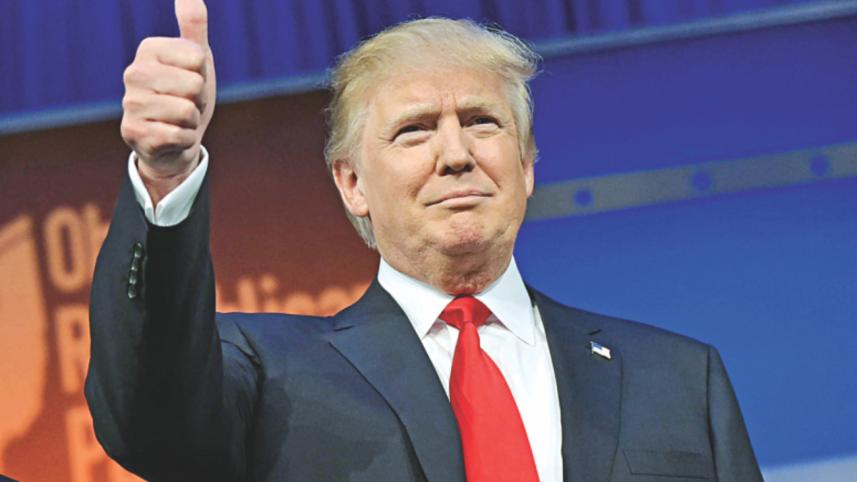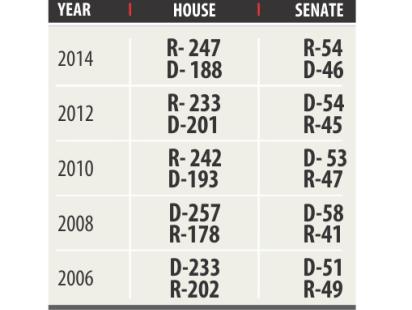Republicans retain Senate, House

Republicans maintained their majorities in both chambers of the US Congress in Tuesday's momentous election in which Republican Donald Trump won the presidency, empowering the party to reshape Washington.
The Republican sweep sets up the US for two years of "unified" government, which would normally mean significant policy change, reports Reuters.
Trump's White House victory marks a stunning political trifecta for Republicans that would allow them to control the legislation that makes its way through Congress and to the president's desk.
In a huge disappointment to Democrats, Republicans were on a pace to lose only a handful of seats in the House, well below the double-digit losses some predicted.
Similarly, Democrats gained only one seat in the Senate, although a few races were still to be determined, including New Hampshire, where incumbent Republican Kelly Ayotte was deadlocked with Democrat Maggie Hassan yesterday.
In Illinois, Democratic US Representative Tammy Duckworth defeated Republican Senator Mark Kirk.
In the House, Republicans secured 238 seats to the Democrats' 193, reports AFP.
That was a five-seat gain for Democrats, but still well short of what would be necessary to snatch the 435-member chamber back from Republican control.
Republicans also managed to repel the Democrats' sharp threat in the 100-member Senate. They held 52 seats to 47 for the Democrats.
Republicans faced the threat of losing the chamber's control. But they rallied to minimise their losses, with incumbents in the battleground states of Pennsylvania, North Carolina and Wisconsin snatching crucial victories to prevent a blue takeover.
Democrats lost the chamber in 2014 and needed a net gain of five seats to retake the Senate with Trump in the White House.
But they fell short.
Many experts and political analysts had predicted a Democratic takeover, given the daunting math facing Republicans -- who had to defend far more seats -- and Trump's erratic campaign, reports the Los Angeles Times.
But just as they underestimated the Republican nominee, they failed to account for the resiliency of some of the GOP's most endangered incumbents.

Republicans staked victories in every one of the hardest-fought contests, with one exception. In Illinois, Democratic Representative Tammy Duckworth knocked off Mark Kirk, long seen as the most vulnerable GOP member of the Senate.
In Wisconsin, Ron Johnson had been all but written off by strategists in both parties. Instead, he handily fended off a comeback attempt by former Democratic Senator Russell D Feingold. In North Carolina, Richard M Burr won a second term despite waging a lacklustre campaign.
In Arizona, Senator John McCain easily won a sixth term after the toughest challenge of his lengthy career and Senator Roy Blunt of Missouri also withstood a more-difficult-than-expected fight. In Pennsylvania, Patrick J Toomey won after casting himself in a bipartisan light and touting his work with Democrats on gun control.
Tuesday's outcome for Senate Republicans may only be slightly less momentous for the GOP than Trump's looming victory, according to Politico.
It gives them control of the Supreme Court for years to come, a huge issue for the conservative base. When combined with a favourable map in 2018, Republicans could be on the verge of building a majority that could last well into the next decade.
Senate Majority Leader Mitch McConnell (from Kentucky) could go down as one of the most successful Republican leaders in years, while Minority Leader Harry Reid (from Nevada) will leave office with his hopes of a Democratic majority crushed by his arch-rivals Trump and McConnell, the report adds.
The new Congress will not convene until January 3, but the "lame-duck" Congress will return next week and Republicans are set to begin the process of picking leaders for both chambers.
Paul Ryan's position as the House of Representatives speaker could be challenged by Republican conservatives who backed Trump and it remains to be seen if the president-elect himself will try to push Ryan out.
On the campaign trail, Trump offended and attacked some congressional Republicans, including Ryan who held Trump at arm's length during the campaign.
"Trump seems magnanimous right now," an aide to one of Trump's House supporters said after Trump stressed unity in his victory speech in New York. "We shall see."
Yesterday, shortly after Hillary Clinton conceded to Trump, Ryan said in a statement, "We are eager to work hand-in-hand with the new administration to advance an agenda to improve the lives of the American people."
Senate Majority Leader Mitch McConnell, also a Republican, said in a guarded and similarly timed statement, "The American people have chosen a new direction for our nation."



 For all latest news, follow The Daily Star's Google News channel.
For all latest news, follow The Daily Star's Google News channel.
Comments